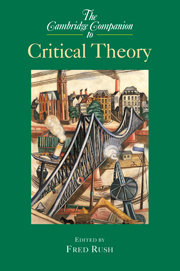Book contents
- Frontmatter
- Introduction
- 1 Conceptual foundations of early Critical Theory
- 2 Benjamin, Adorno, and the decline of the aura
- 3 The dialectic of enlightenment
- 4 The marriage of Marx and Freud
- 5 Dialectics and the revolutionary impulse
- 6 “The dead speaking of stones and stars”
- 7 Critique, state, and economy
- 8 The transcendental turn
- 9 The politics of Critical Theory
- 10 Critical Theory and the analysis of contemporary mass society
- 11 Critical Theory and poststructuralism
- 12 The very idea of a critical social science
- 13 A social pathology of reason
- Select bibliography
- Index
4 - The marriage of Marx and Freud
Critical Theory and psychoanalysis
Published online by Cambridge University Press: 28 May 2006
- Frontmatter
- Introduction
- 1 Conceptual foundations of early Critical Theory
- 2 Benjamin, Adorno, and the decline of the aura
- 3 The dialectic of enlightenment
- 4 The marriage of Marx and Freud
- 5 Dialectics and the revolutionary impulse
- 6 “The dead speaking of stones and stars”
- 7 Critique, state, and economy
- 8 The transcendental turn
- 9 The politics of Critical Theory
- 10 Critical Theory and the analysis of contemporary mass society
- 11 Critical Theory and poststructuralism
- 12 The very idea of a critical social science
- 13 A social pathology of reason
- Select bibliography
- Index
Summary
The members of the Institute for Social Research were the first group of philosophers and social theorists to take psychoanalysis seriously - indeed, to grant Freud the stature that is generally reserved for the giants of the philosophical tradition. In addition to Hegel, Marx, and Weber, Freud became one of the foundation stones on which their interdisciplinary program for a critical theory of society was constructed. It has often been observed that the Critical Theorists turned to psychoanalysis to make up for a deficiency in Marxian theory, namely, its reduction of the psychological realm to socioeconomic factors. This explanation, however, does not go far enough. With a few notable exceptions, the Left was not particularly interested in the modernist cultural movements of the past century - or, worse yet, denounced them for their bourgeois decadence. Though it may have proved to be an impossible project, the Frankfurt School - largely under Adorno's influence - sought to integrate cultural modernism with left-wing politics. And this is one of the places where psychoanalysis came to play an important role. For, despite Freud's own stolid lifestyle and aesthetic conservatism, his creation, psychoanalysis, made an incontrovertible contribution to the radical avant-garde that was transforming almost every realm of European culture. The Interpretation of Dreams and Ulysses are cut from the same cloth.
- Type
- Chapter
- Information
- The Cambridge Companion to Critical Theory , pp. 74 - 102Publisher: Cambridge University PressPrint publication year: 2004
- 11
- Cited by



